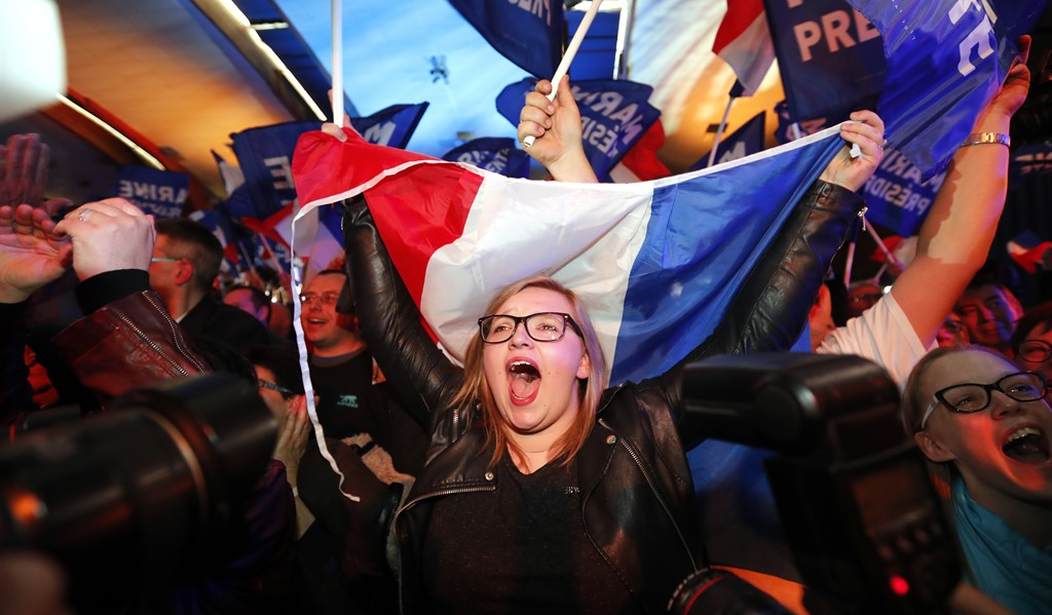Editor's Note: This column was written by Ferghane Azihari.
Long regarded as the guardians of the international liberal order, developed countries are now submerged in authoritarian ideologies. The first major country to be hit by this authoritarian wave is the United States, whose president was elected on a radical nationalist and protectionist discourse. France is probably the next country on the list. Even if Marine Le Pen is not elected, the far-right National Front Party has already won the cultural battle, leading mainstream parties to radicalize their stances on social, economic, and security issues. Right-wing authoritarianism is moreover challenged by radical left leader Jean-Luc Mélenchon’s Marxist rhetoric. If we add up the total votes for the far-left and the far-right during the first round of the presidential election, these are at least 40 percent of French voters who have praised authoritarian agendas.
The rise of these ideologies is linked to at least two main factors: the first one is the last economic crisis and out-going President François Hollande’s failure to tackle the issue of unemployment and rising poverty. Although France remains one of the most taxed and regulated countries in the Organization of Economic Cooperation and Development (OECD), the economic problems have been attributed to so-called free-market policies. The second one is the recent terrorist attacks. They helped to give some credibility to authoritarian and nationalist stances which promise to defeat Islamist ideologies and other “threats” to French culture, like immigration, even if it implies further civil liberties restrictions. This social context reinforces the French electorate’s perception of globalization as a dangerous phenomenon against which they have to be protected by the nation-state’s sheltering arms.
However, the danger of these protectionist trends lies in the fact they may accelerate the disintegration of the French economy, while weakening collective security. This is the vicious circle described by Nobel prize-winning economist Friedrich Hayek in his famous 1944 book The Road To Serfdom. Hayek observes that government’s meddling with society in the name of resolving existing problems only makes them bigger, and increases the appeal of bureaucratic interventions. As a result, the progressive centralization of economic decision-making leads to more and more despotic political regimes.
Recommended
This is exactly what is happening in France. It is now France’s turn to challenge the old right/left divide it invented two centuries ago after its revolution. As The Economist argued, the new political divide emerging in developed countries is the support for open and pluralistic societies against nostalgia for inflexible nation-states closed to international trade.
To win this cultural battle in their respective countries, proponents of open societies cannot only rely on themselves. They have to count on successful examples coming from abroad. Indeed, politics is, despite nationalist claims, very internationalized. The nation-state is not the main and exclusive frame for the public sphere, internal policies included. New technology reinforces the transnational nature of the public debate. Ideological discourses do not hesitate to solicit concrete examples of successful or failed policies abroad to justify their stances at home.
Hungary’s Prime Minister Viktor Orban has several times advocated the model of “illiberal democracy”, praising countries like Russia, China, or Turkey. Since Donald Trump’s victory, Le Pen has continuously used the U.S. as an example to reinforce the credibility of her protectionist program. That is why remaining liberal regimes across Europe and the world have a moral duty to resist these authoritarian shocks. Their relatively free market model has to strengthen itself in order to remain available to be a reference, an anchor point from which proponents of open societies in authoritarian regimes can defend themselves in the upcoming new clash of civilizations.
In this permanent fight, free movement of goods, capital, people, services and ideas is not only an efficient economic policy, it is also a precious political instrument and a counter-power towards authoritarian regimes. Indeed, there is a reason why those regimes have historically remained very closed to international trade. They know that trade is a powerful thermometer.
When an authoritarian government sees people and capital flee from its jurisdiction to another, it is a disavowal, which can be extremely costly for political credibility. People emigrating from their native country constitute diasporic communities who often challenge the official propaganda about the quality of local institutions. By trading, working and investing elsewhere than their original country, citizens of repulsive regimes contribute to weaken the prestige of despotic governments while increasing abroad and at home the credibility of functioning liberal institutions.
But this political thermometer only works when there is a sufficient number of political regimes aiming to take up the torch of free-market and openness. Some commentators talk about Canada. Others praise Germany. But this is certainly not enough to balance illiberal powers’ influence coming from America, Asia, or Europe for the next years. The international liberal order therefore desperately needs new models and new guardians. Who is going to take this responsibility?
Ferghane Azihari is Local Coordinator for European Students for Liberty in France, regular contributor to the Ludwig von Mises Institute and a Young Voices Advocate.

























Join the conversation as a VIP Member